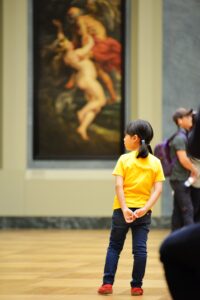Why is Arts Education a matter of social justice?
Art is undoubtedly one of the best means of expression to foster participation in equality and freedom. The education for social justice has a clear commitment to art and arts education to create a democratic society capable of building spaces of participation and dialogue.
 Despite Spanish education laws have progressively diminished arts education, from the Chair we promote the research and the dissemination of the social impact that art has as a tool for education in and for social justice. A canvas, a sculpture, a melody or a poem can be excellent teaching resources if used appropriately in the classroom due to their interdisciplinary potential.
Despite Spanish education laws have progressively diminished arts education, from the Chair we promote the research and the dissemination of the social impact that art has as a tool for education in and for social justice. A canvas, a sculpture, a melody or a poem can be excellent teaching resources if used appropriately in the classroom due to their interdisciplinary potential.
Among the possibilities offered by artistic education for social justice, we can highlight that through art the stories and experiences of those groups and individuals most vulnerable are listened, and offer us multiple ways of seeing and understanding reality. It also promotes artistic sensitivity, recognition and tolerance among our students. In addition, thanks to art we fly to other worlds, but it also makes us land on earth and critically understand the elements that shape our culture and way of seeing the world.
Under the perspective of an education for social justice, art has great potential to broaden the understanding of injustices and forms of domination. Furthermore, artistic production offers us opportunities not only to denounce oppressive practices, but to contribute to a social transformation and propose new emancipatory and inclusive realities. As the German poet and playwright Bertolt Brecht said well, “Art is not a mirror held up to reality but a hammer with which to shape it”.
In the same way, and speaking about the objectives of an artistic education for social justice, our colleague Ángeles Saura points out that it consists of provoking a reflection and later an action related to artistic practice, the educational implications of which impact in some way on the social context in which it develops (2015). Arts education fosters the agency, critical capacity and creativity that have always been necessary, but more in our times. For this reason, art and arts education for social justice are fundamental for the common transformation of the society in which we live.
